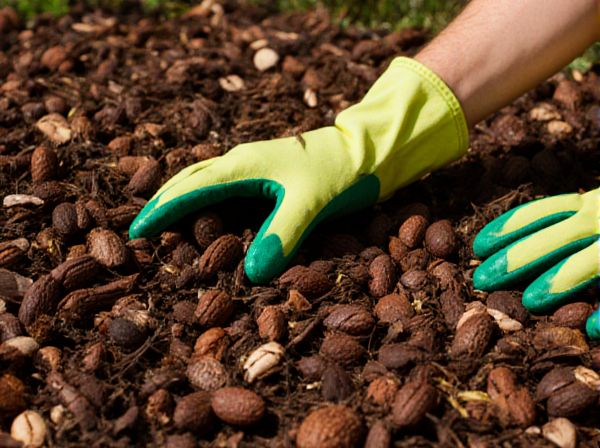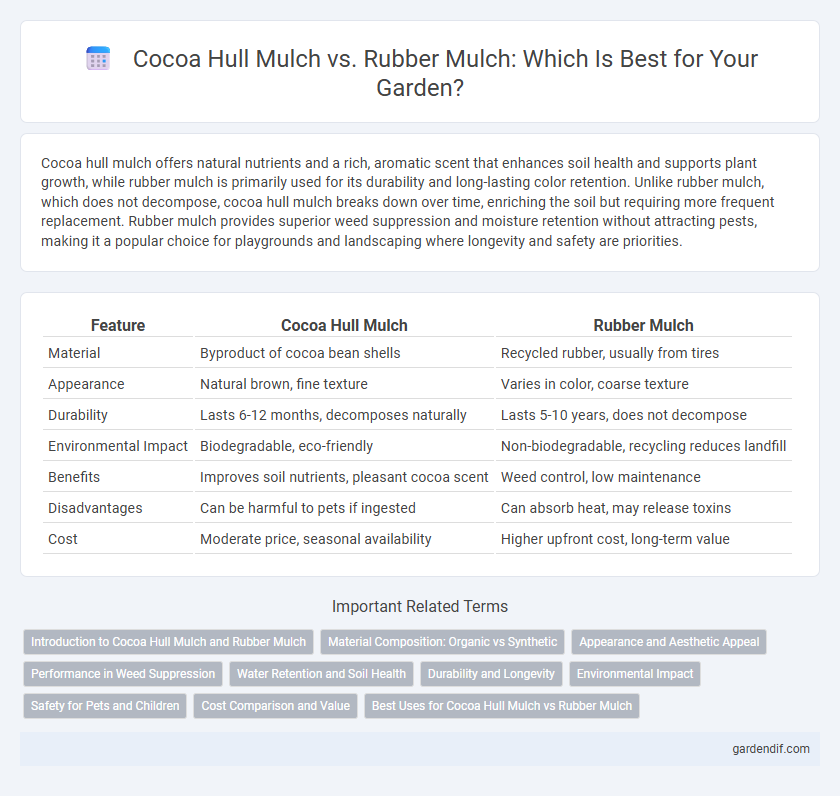
Cocoa hull mulch vs rubber mulch Illustration
Cocoa hull mulch offers natural nutrients and a rich, aromatic scent that enhances soil health and supports plant growth, while rubber mulch is primarily used for its durability and long-lasting color retention. Unlike rubber mulch, which does not decompose, cocoa hull mulch breaks down over time, enriching the soil but requiring more frequent replacement. Rubber mulch provides superior weed suppression and moisture retention without attracting pests, making it a popular choice for playgrounds and landscaping where longevity and safety are priorities.
Table of Comparison
| Feature | Cocoa Hull Mulch | Rubber Mulch |
|---|---|---|
| Material | Byproduct of cocoa bean shells | Recycled rubber, usually from tires |
| Appearance | Natural brown, fine texture | Varies in color, coarse texture |
| Durability | Lasts 6-12 months, decomposes naturally | Lasts 5-10 years, does not decompose |
| Environmental Impact | Biodegradable, eco-friendly | Non-biodegradable, recycling reduces landfill |
| Benefits | Improves soil nutrients, pleasant cocoa scent | Weed control, low maintenance |
| Disadvantages | Can be harmful to pets if ingested | Can absorb heat, may release toxins |
| Cost | Moderate price, seasonal availability | Higher upfront cost, long-term value |
Introduction to Cocoa Hull Mulch and Rubber Mulch
Cocoa hull mulch, derived from the shells of cacao beans, is a natural, biodegradable option rich in nutrients that enrich soil and improve moisture retention. Rubber mulch, made from recycled tires, offers long-lasting durability and excellent weed control but lacks soil-enriching properties and can pose environmental concerns. Choosing between cocoa hull mulch and rubber mulch depends on factors such as soil health benefits, environmental impact, and aesthetic preferences.
Material Composition: Organic vs Synthetic
Cocoa hull mulch is derived from the outer shells of cocoa beans, making it an organic mulch that enriches soil fertility as it decomposes. Rubber mulch consists of shredded synthetic rubber, typically sourced from recycled tires, providing long-lasting durability without nutrient contribution. The organic nature of cocoa hull mulch supports microbial activity and soil health, whereas rubber mulch primarily offers weed suppression and moisture retention without biodegrading.
Appearance and Aesthetic Appeal
Cocoa hull mulch offers a rich, chocolate-brown color that enhances garden beds with a natural, organic look, blending well with plants and soil for a warm, inviting aesthetic. Rubber mulch, available in a variety of vibrant colors, provides a uniform and modern appearance but can sometimes appear synthetic, contrasting with natural garden elements. The choice between cocoa hull and rubber mulch largely depends on whether a natural or decorative visual appeal is preferred in the landscape design.
Performance in Weed Suppression
Cocoa hull mulch offers superior weed suppression due to its dense, fine texture that creates an effective barrier against weed germination. Rubber mulch, while durable and long-lasting, lacks the organic properties that inhibit weed growth naturally, making it less effective at weed control. Studies indicate cocoa hull mulch can reduce weed growth by up to 70%, outperforming rubber mulch in maintaining a weed-free environment.
Water Retention and Soil Health
Cocoa hull mulch excels in water retention by retaining moisture longer and slowly releasing nutrients that enhance soil health, promoting microbial activity and improving soil texture. Rubber mulch, while effective at preventing water evaporation from the soil surface, does not contribute organic matter or nutrients, potentially limiting soil fertility over time. Organic cocoa hull mulch supports sustainable soil ecosystems, whereas rubber mulch primarily serves as a moisture barrier without benefiting soil biology.
Durability and Longevity
Cocoa hull mulch offers natural biodegradability, typically lasting one to two years before breaking down and enriching the soil, while rubber mulch is made from recycled tires and can last up to 10 years due to its resistance to decomposition. The durability of rubber mulch ensures minimal replacement and strong weather resistance, making it ideal for high-traffic areas. In contrast, cocoa hull mulch provides organic benefits but requires more frequent replenishment because of its shorter lifespan.
Environmental Impact
Cocoa hull mulch is biodegradable and enriches soil by decomposing naturally, releasing beneficial nutrients that enhance plant growth and improve soil health. Rubber mulch, derived from recycled tires, does not decompose and can leach harmful chemicals into the soil over time, posing environmental risks. Choosing cocoa hull mulch supports sustainable landscaping practices by reducing waste and promoting eco-friendly gardening compared to the long-term pollution concerns associated with rubber mulch.
Safety for Pets and Children
Cocoa hull mulch contains theobromine, a compound toxic to dogs and cats, posing potential health risks if ingested, whereas rubber mulch is non-toxic and safer for pets and children. Rubber mulch also reduces the risk of fungal growth and harmful molds that can develop in organic mulches like cocoa hulls. Choosing rubber mulch offers a safer environment by minimizing exposure to toxic substances and allergens for both children and pets.
Cost Comparison and Value
Cocoa hull mulch generally costs more per cubic yard compared to rubber mulch but offers superior organic benefits like nutrient release and soil improvement. Rubber mulch is cheaper upfront and highly durable, lasting several years without decomposition, making it cost-effective for long-term use. Evaluating total value requires balancing cocoa hull mulch's soil enhancement against rubber mulch's longevity and lower replacement frequency.
Best Uses for Cocoa Hull Mulch vs Rubber Mulch
Cocoa hull mulch is ideal for flower beds, vegetable gardens, and shaded areas due to its rich nutrients and natural texture that improve soil quality and moisture retention. Rubber mulch excels in playgrounds, pathways, and erosion control areas because it is durable, long-lasting, and provides excellent cushioning. Choosing cocoa hull mulch enhances plant growth with organic matter while rubber mulch offers superior safety and low maintenance.
Cocoa hull mulch vs rubber mulch Infographic

 gardendif.com
gardendif.com